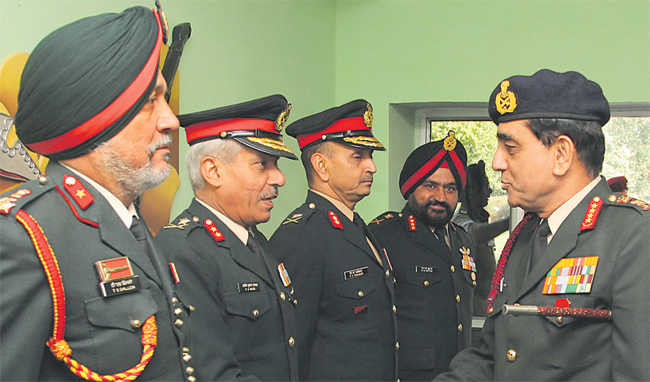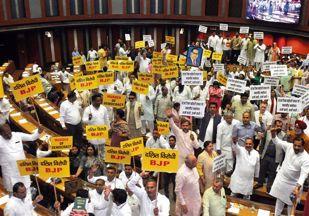
General Deepak Kapoor meeting senior Army officers at the Western Command headquarters. The single-stream promotion policy was amended during his tenure as COAS. The bitterness caused by the two-stream model will negatively impact the Army.
Lt Gen OP Kaushik (retd)
RECENTLY, the Army has been in the news about the promotion policy drafted by the Army headquarters for promotion to the ranks of Major General and Lieutenant General. The Ministry of Defence (MoD) sat on the draft for over six months and then returned it unapproved. Due to this delay two Major Generals, who had been approved for promotion to the rank of Lieutenant General, retired without picking up the next rank and three others have lost an opportunity to command a corps resulting in frustration and discontentment among senior officers of the Army.
Prior to General Deepak Kapoor taking over as the Chief of Army Staff (COAS), the promotion policy in vogue for promotion to the ranks of Brigadier to Major General and Major General to Lieutenant General was that the promotion board put all those approved for promotion in one common list and it was called a single-stream promotion policy. It implied that the approved officer was fit to hold an appointment involving command of troops as well as staff appointment, which is purely administrative in nature. General Kapoor amended this policy and all those who were approved for promotion were put in two different lists, that is those who will command troops (command stream) and those who will hold only administrative assignments (staff stream). This also implied that officers put in the staff stream were not to be considered for any further promotion and would be considered junior to those who were placed in the command stream. The above scheme, although approved by the MoD, caused discontentment in the Army and all the officers' placed in the staff stream went on appeals to the Army headquarters, the government as well as to the courts to seek redressal. General VK Singh, who succeeded General Deepak Kapoor as the COAS, was constrained to have a relook on the issue. The matter was placed before the Army Commanders’ conference and all the Army Commanders unanimously decided that the organisation should switch back to the single- stream promotion system. Recommendations made by the Army Commanders (Army Board) were sent to the MoD. Arguments in support of the single stream were: better promotion avenues for all, equality of opportunity, improve the stinging environment that the two-stream policy had generated as also to reduce appeals and challenges in the courts of law.
The MoD sought the opinion of the Solicitor General on the amended policy. Interestingly, no such advice was demanded when Gen Kapoor amended the existing policy. The Solicitor General in his specific comments stated: “Till the time the Army frames a comprehensive fresh promotion policy, the current one should be adhered to since ad hoc measures will be counterproductive.” The MoD, based on the Solicitor General's remarks, did not approve the draft promotion policy. Army Commanders, who constitute the apex body of Army organisation, had made these recommendations after feeling the pulse of the entire Army. During the survey, not a single person had opined in favour of dividing promotions into two different streams. Since the policy, as amended, was universally favourable to one and all, there could be no legal implications. The unfounded fears of the Solicitor General that it could be challenged in the court of law had no basis. After all, on what account would anybody challenge it? It placed everybody in one stream, that is the command stream. It affected no one's seniority and offered all a better career profile. More serious was the bitterness that had been caused by the two-stream policy. There is no specific criteria or qualifications to be considered for dividing the approved officers into command and staff streams. The promotion board prepares a list of officers approved for promotion. From that list, officers appearing lower in order of merit are placed in the staff streams. It is, therefore, a most ad hoc, arbitrary and flawed policy and denies equality of opportunity to all.
The two-stream model was first conceived in 1986 by General K. Sundar ji, the then COAS, for promotion from Colonel to Brigadier. It could not be implemented for want of approval by the MoD. Efforts were made to revive the two-stream policy in 1992 for promotion from Major General to Lieutenant General on the basis of age in that if an officer, on promotion to the rank of Lieutenant General, did not have more than four years residual service, he was denied command of a corps (involving command of troops) and was promoted only on a staff appointment. This period was subsequently reduced to three years. Furthermore, after having commanded a corps and having rendered distinguished performance, including earning highest decoration, if an officer did not have more than two years residual service, was not promoted as an Army Commander. It is amazing that suddenly a highly experienced and decorated officer gets bracketed as an inferior officer and a mediocre person is moved up just because he has few more years to serve. It is so surprising that the Army has allowed itself to languish in such a lackadaisical and destructive policy. It would have been better to promote the officer to the rank of an Army Commander and give them minimum two years in that appointment or the date of retirement, whichever is later. This provision has been made in some selected secretary-level promotion in civil services. Notwithstanding the MoD's refusal to accept an amendment to the two-stream policy, its ramifications are dangerously serious and will negatively impact the functional efficiency of the Army. Hence, soon it will have to be revised under the comprehensive promotion policy as suggested by the Solicitor General. This must be done at the earliest to save the Army from its negative influence.
The writer has been a General Officer Commanding in the Kashmir Valley & Chief of Staff Eastern Army



























